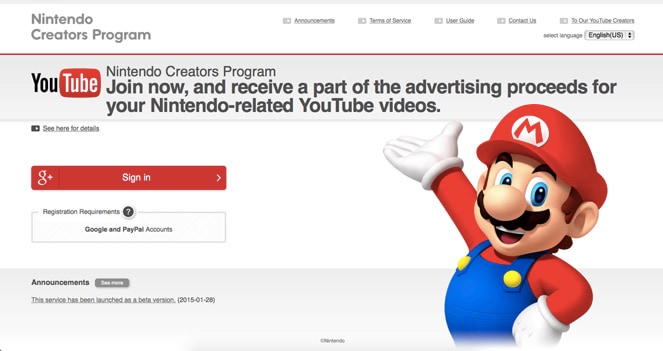Trending
Opinion: How will Project 2025 impact game developers?
The Heritage Foundation's manifesto for the possible next administration could do great harm to many, including large portions of the game development community.

Featured Blog | This community-written post highlights the best of what the game industry has to offer. Read more like it on the Game Developer Blogs or learn how to Submit Your Own Blog Post
Game lawyer Zachary Strebeck looks at Nintendo's new Creator Program, which allows revenue sharing for YouTube videos featuring Nintendo games.


Back in May 2013, the Internet (or the YouTube “Let’s Play” portion of it) exploded when Nintendo began to issue ContentID claims against videos containing Nintendo’s copyrighted material. Now, the Japanese console company has opened up a beta version of its new “Creators Program” service, allowing automated revenue sharing for those who wish to use this content on their channels.
YouTube’s ContentID system is an automated copyright takedown or revenue-capturing method for the video service. Basically, a copyright owner alerts the ContentID system of its various intellectual properties by uploading videos or audio examples of it. When the ContentID system finds a match, the system triggers and does one of the following:
Mute audio that matches their music
Block a whole video from being viewed
Monetize the video by running ads against it
Track the video’s viewership statistics

Basically, the system allows the content owner to pre-set the action to be taken, circumventing the need to do the proper DMCA takedowns. This is seemingly a way to make things easier for content owners, to the detriment of those who are creating YouTube videos. ContentID, for instance, does not take fair use into account before taking down a video.
A YouTuber can dispute the ContentID claim, but the owner of the content then has 30 days to respond. If not, the content goes back up. However, the creator of the video may have just lost out on a month’s ad revenue or exposure due to having the video taken down for that long. This is particularly damaging for those who make their living from their YouTube channel.
You can read more about ContentID at these links:
How ContentID works
Disputing a ContentID claim
Qualifying for ContentID
There was a big backlash against Nintendo back in 2013 when they first did this. However, things got even crazier in December 2013, when YouTube began to aggressively enforce these claims.
YouTubers who were making videos of games from many companies had their videos taken down en masse, forcing many in the industry into a debate on the entire Let’s Play phenomenon. This debate is still going on, and it often centers on whether or not a Let’s Play video qualifies as a fair use under copyright law.
I’m not going to go into Fair Use here, as it is a huge subject to cover. The real answer is: it depends. There are a lot of nuances and fact-specific issues with fair use. Luckily, I’ve written an entire eBook on the subject, particularly when it comes to YouTube videos. You can get it for free on my site.

Now that that’s all out of the way, let’s talk about the Creators Program.
The program allows those who wish to make YouTube videos featuring Nintendo content to register a channel or an individual video. They are allowed to use the copyrighted material from a specific list of Nintendo’s games. In exchange, there is a revenue share between Nintendo and the creator of the video, with channels getting 70 percent of ad revenue and individual videos getting 60 percent.
The rules require a disclaimer on the video, either spoken or written, saying that the content is not endorsed by Nintendo and that it is part of the program. Nintendo will then receive all of the revenue and pay out the percentage directly to the YouTube creator each month.
One troubling thing in the rules is this:
“The advertisement revenue share is 70% for channels and 60% for videos.
(This rate may be changed arbitrarily. )”
I’ll give you one guess (no, it’s not the space after the period in the parentheses, though that is disturbing).
If they can change the rate “arbitrarily,” and the word arbitrary means what the word traditionally means, then do they really have a contract? In the actual Terms of Service for the program, the language is this: “Your percentage share of any such advertising revenue will be listed on your account page of the Nintendo Creators Program website, and is subject to change from time to time.”
I’ve written before about “illusory” contracts, where the terms of the deal can be changed at the whim of one party. Those terms are generally not enforceable.
Update: I'm going to redact this section for a bit until I figure out the implications pointed out by a commenter below regarding the governing law here. However, creators should be aware that, if they did have some legal issue, it would have to be brought in Kyoto district court. That's a bit rough for the average YouTuber.

However, on the whole, I think this is a good step to normalizing licensing of IP for purposes of content creation. These videos generally benefit the developers and publishers of these games.
The main argument on the side of the YouTubers is that it is free advertising. The other side often argues that the YouTubers are making money off the backs of the developers’ hard work by simply playing the games and talking over them. The transformative quality of such a use is debatable, at the very least.
I think this is exactly what needs to be done, on a larger scale. I wish YouTube could implement something like this into the system where revenue can be shared by percentage, rather than all-or-nothing. This can make it easy for both copyright owners and content creators to benefit and have a symbiotic relationship, rather than a parasitic one (I’m not saying who the parasite is – it’s usually the side who isn’t you in these kinds of debates).

There is probably a perception that, since I’m a lawyer, I should be on the side of the big corporations and IP holders. I do think that those who invest in creating intellectual properties should be compensated for the use of those properties.
However, I also think that legitimate fair uses are an important limitation of copyright law. Heck, they’re allowing me to use screenshots of the Nintendo site right in this post. I’m very much in favor of fair use when it is used intelligently and appropriately. I’m also a big proponent of IP holders and content creators working together and getting contracts in place to avoid issues, such as the aforementioned ContentID-pocalypse (or #ContentIDgate, if you’d prefer).
We’ll see if more programs or deals like this sprout up in the coming months or years. In the meantime, I’m curious what the reaction in the game community is. Please leave comments below!
Read more about:
Featured BlogsYou May Also Like